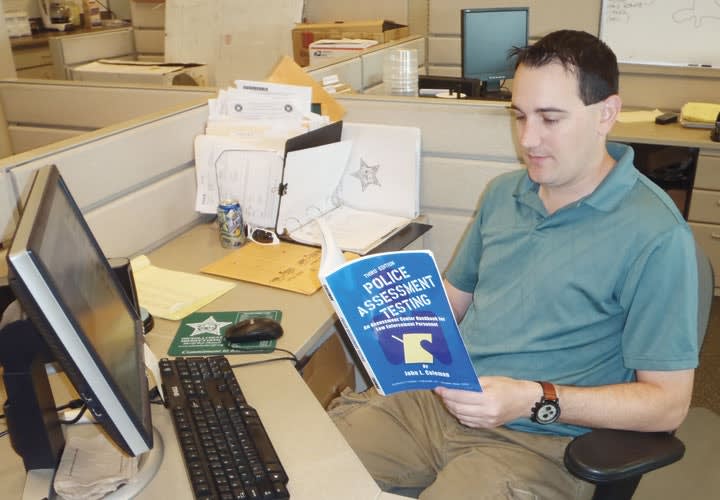All law enforcement agencies use a hierarchical organization that includes a rank structure and a division of labor. Typically that means that in order to achieve the rank of first- or second-line supervisor, you have to take some type of written examination. Attaining higher ranks usually involves the agency head magically saying, "Poof, you're now a captain." I can't help you with that, but I can help you score higher on your next exam by sharing some useful information from my past experience and what I've learned from cognition and learning experts.
To achieve high scores on my exams I had to work my tail off and sacrifice a great deal. Unless you're gifted with a superior intellect and ironclad memory, so will you.
Commitment
If you don't really want it, then don't waste your time because your first real challenge is commitment. Are you willing to do whatever it takes to come out number one? Are you willing to put in the time and effort? Are you willing to put everything else aside including your family, friends, and your favorite activities while you study? If you can say yes to these questions, then you are off to a good start.
Once you make the commitment, you need to start studying immediately. A major key to your success is starting right now and not waiting for the exam to be announced. It is easier to retain information over a long period of time than trying to cram it in during a short one.
Since everyone will have to study the same material, there is no edge hidden there. For example, everyone will read the supervision book and answer the questions at the end of each chapter. The edge you need is found in how you study and how often.
Why We Forget
There are some very strong clues that will help you study if you look at why people forget information in the first place. The author of an article from CollegeAtlas.org titled "How to Retain Information" suggests the following:
It's easy to forget information we don't understand.
To remember something new, it must be clearly imprinted in the brain. It's important to schedule periodic study sessions and constantly review information.
Uninteresting concepts are difficult to remember.
Everyone forgets information that is not constantly reviewed.
Students often forget what they've studied because it's presented differently on tests.
Lack of attention and effort will result in a lack of retention.
Analyzing these clues provides some guiding principles to follow:
Try to understand core principles and how they are applied.
Study on a regular schedule and increase frequency.
If something is uninteresting, try to find a way to connect with it and make it interesting, or at least make it important in your mind.
In order to remember, you have to constantly review.
Stop memorizing and learn the principle behind things so you can apply it.
It requires intense concentration to remember new information. When studying, concentrate on one topic or concept at a time.
How We Remember
The biggest key to remembering is paying attention. You need to focus while you are studying. There is a difference between playing relaxing music while you study and playing head banger music that distracts you. If your spouse, children, or phone are constantly interrupting you, your study session becomes worthless. Pick a time and place where you can study uninterrupted. That may mean waking up before everyone else or studying when they are already in bed, hence the term sacrifice.
But focus isn't the only component. There are other ways to help you study and remember better. In Sue Shellenbarger's article, "Toughest Exam Question: What is the Best Way to Study?" she suggests that there are four ways to help you remember. The first is to test yourself repeatedly before any exam. This way you are teaching your brain to retrieve and apply knowledge from memory.
The second is to remember that sleep plays an important part in your success. Being tired only hurts your cognition abilities. A great tip is to review the toughest material right before going to bed the night before the test. It will help you recall the information later. Don't confuse that with studying in an all-nighter; they don't work. Studies have shown that test scores are significantly lower when you do.
Third, get used to eating a balanced diet. This means getting enough fruits and vegetables because the brain requires a constant supply of energy.
Lastly, if you get nervous before a test, you need to think differently about it. You need to change your attitude so you can change your results.
Make it Count
This advice applies equally to all of your testable material. It doesn't matter whether you have to learn a management book, administrative procedures, policy and procedure, or all the above. If you want results, you've got to put in the work. Take studying seriously and apply these techniques to improve retention.
During my test-taking days, I would start early and work myself into a final 90-day countdown schedule that included a morning study session and an evening study session on my work days. I would then hit it harder on my days off by doubling my study time in the morning and evening. I gave myself one day off a week of formal study to keep my sanity and my connection with my family.
When I was working, I tried to find time to review my policy and procedure, which is always a good idea whether you are taking a test or not. If you don't commit the time and effort, someone else will. Aren't you already saying "Yes, sir" or "Yes, ma'am" to some of your peers that beat you the last time?
I had a college professor during my master's program at the University of Central Florida named Dr. Lanier. His class was killing me and had me thinking I was just not smart enough to finish. Luckily for me, he snapped me back to reality telling me that it wasn't about being smart; it was about working harder. We started with 28 in his class and only five of us finished. Experience has taught me that he was correct; you don't have to be smart, you just have to work harder.
Amaury Murgado is a special operations lieutenant with the Osceola County (Fla.) Sheriff's Office. He is a retired master sergeant from the Army Reserve, has 25 years of law enforcement experience, and has been a lifelong student of martial arts.
Related:
How to Study: 7 Tricks of the Trade
How Do I Advance My Career?
How to Get Promoted











